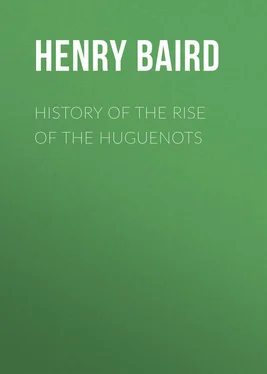Henry Baird - History of the Rise of the Huguenots
Здесь есть возможность читать онлайн «Henry Baird - History of the Rise of the Huguenots» — ознакомительный отрывок электронной книги совершенно бесплатно, а после прочтения отрывка купить полную версию. В некоторых случаях можно слушать аудио, скачать через торрент в формате fb2 и присутствует краткое содержание. ISBN: , Жанр: foreign_antique, foreign_prose, на английском языке. Описание произведения, (предисловие) а так же отзывы посетителей доступны на портале библиотеки ЛибКат.
- Название:History of the Rise of the Huguenots
- Автор:
- Жанр:
- Год:неизвестен
- ISBN:http://www.gutenberg.org/ebooks/30708
- Рейтинг книги:4 / 5. Голосов: 1
-
Избранное:Добавить в избранное
- Отзывы:
-
Ваша оценка:
- 80
- 1
- 2
- 3
- 4
- 5
History of the Rise of the Huguenots: краткое содержание, описание и аннотация
Предлагаем к чтению аннотацию, описание, краткое содержание или предисловие (зависит от того, что написал сам автор книги «History of the Rise of the Huguenots»). Если вы не нашли необходимую информацию о книге — напишите в комментариях, мы постараемся отыскать её.
History of the Rise of the Huguenots — читать онлайн ознакомительный отрывок
Ниже представлен текст книги, разбитый по страницам. Система сохранения места последней прочитанной страницы, позволяет с удобством читать онлайн бесплатно книгу «History of the Rise of the Huguenots», без необходимости каждый раз заново искать на чём Вы остановились. Поставьте закладку, и сможете в любой момент перейти на страницу, на которой закончили чтение.
Интервал:
Закладка:
84
Ibid., liv. iii., c. 9.
85
Even so late as May 8, 1562, the English minister resident at the court, than whom probably no other person in France felt obliged to keep himself better informed, wrote to Cecil respecting the Prince of Condé's strength: "I can assur you att thys dyspatche he ys the strongest partie , and in suche state his matter standeth, that these men [the court] wold fayne have a reasonable end, thoughe yt were with some dishonnour ." MSS. State Paper Office, Duc d'Aumale, Princes de Condé, Pièces justif., i. 370.
86
It is strange that a historian at once so conscientious and generally so well-informed as M. Rosseeuw Saint-Hilaire should, in his Histoire d'Espagne, ix. 60, 61, have made the grave mistake of holding Calvin responsible for the excesses of the iconoclasts. See the Bulletin, xiv. 127, etc., for a complete refutation.
87
Like the undeceived dupe in the old Athenian comedy, who mournfully laments that he had been led to worship a bit of earthenware as a god:
Οἴμοι δείλαιος,
Ὅτε καὶ σὲ χυτρεοῦν ὄντα θεὸν ἡγησάμην.
(Aristophanes, Clouds, 1473, 1474.)On the other hand, the zealous Roman Catholic had his arguments for the preservation and worship of images, some of which may strike us as sufficiently whimsical. "I confess," says one, "that God has forbidden idols and idolatry, but He has not forbidden the images (or pictures) which we hold for the veneration of the saints. For if that were so, He would not have left us the effigy of his holy face painted in His likeness, on the cloth which that good lady Veronica presented Him, which yet to-day is looked upon with so much devotion in the church of St. Peter at Rome, nor the impression of His holy body represented in the 'saint suaire' which is at Chambéry. Is it not found that Saint Luke thrice made with his own hand the portrait of Our Lady?.. That holy evangelist ought certainly to have known the will of his Lord and Master better than you, my opponent, who wish to interpret the Scripture according to your sensuality." Discours des Guerres de Provence (Arch. curieuses, iv. 501, 502). Of course, the author never dreamed that his facts might possibly be disputed.
88
Les Recherches et Antiquitez de la ville de Caen, par Charles de Bourgueville, sieur du lieu, de Bras, et de Brucourt. À Caen, 1588. Pt. ii. 170-172. From page 76 onward the author gives us a record of notable events in his own lifetime. So also at Cléry, it is to be regretted that, not content with greatly injuring the famous church of Our Lady, the Huguenot populace, inflamed by the indiscretion of the priests, desecrated the monuments of the brave Dunois, and of Louis the Eleventh and his queen. Hist. ecclés. des égl. réf., ii. 23. According to the author of the "Horribles cruautés des Huguenots en France" (Cimber et Danjou, vi. 304), they even burned the bones of Louis; nor did they respect those of the ancestors of the Prince of Condé.
89
"Monsieur, ayez patience que j'aie abattu cette idole, et puis que je meure, s'il vous plaît."
90
"Comme étant ce fait plutôt œuvre de Dieu que des hommes." Hist. ecclés. des égl. réf., ii. 20. "L'impétuosité des peuples était telle contre les images, qu'il n'était possible aux hommes d'y résister." Ibid. ii. 23.
91
Hist. ecclés. des égl. réf., ii. 20-22.
92
"Ledict moys," says Jehan de la Fosse in his journal (p. 47), "des citoyens de Sens tuèrent beaucoup de huguenots, voyant que monsieur le connétable avoict faict brûler Popincourt."
93
Hist. ecclés. des égl. réf., ii. 242-245; Jean de Serres, ii. 40; De Thou, iii. 144. The massacre commenced on Sunday, April 12th (not 14th, as the Hist. ecclés. states), and was continued the next day or two. According to De Serres, the horrors of Sens seemed to efface those of Vassy itself. Read the really terrible paragraph on the subject in the contemporary "Remonstrance au Roy sur le faict des Idoles abbatues et déjettées hors des Temples" (Mém. de Condé, iii. 355-364), beginning "Où sont les meurtres, les boucheries des hommes passés au fil de l'espée, par l'espace de neuf jours en la ville de Sens?" The address to the Cardinal of Guise is not less severe than the address to his brother in the famous " Tigre ": "Te suffisoit-il pas, Cardinal, que le monde sceust que tu es Atheiste, Magicien, Nécromantien, sans le publier davantage, et faire ouvrir en pleine rue les femmes grosses pour voir le siége de leurs enfans?" P. 360. White (Mass. of St. Bartholomew, 200) confounds in his account the two brother cardinals, and makes Lorraine to have been Archbishop of Sens.
94
Letter of Condé of April 19th, Mém. de Condé, iii. 300, 301; Hist. ecclés. des égl. réf., ii. 246, 247; J. de Serres, ii. 40-42.
95
Throkmorton to Cecil, April 10, 1562. State Paper Office.
96
I will not sully these pages even by a reference to the unnatural and beastly crimes which De Thou and other trustworthy historians ascribe to the Roman Catholic troops, especially the Italian part.
97
So late as January, 1561, he wrote: "Quant à la religion, que sa Majesté se peult asseuré que je viveray et moreray en icelle." Gachard, Correspondance de Guillaume le Taciturne, ii. 6.
98
"Et suis mervilleusement mari de veoir comme ces méchantes hérésies se augmente partout," etc.
99
"Qu'il fasse tout debvoir du monde, tant par puplication, comme par force (autant qui j'en porrois la avoir) de remédier à telle désordre, qui est si domagable à tout la christienté."
100
Letter to Card. Granvelle, Oct. 21, 1560, Gachard, i. 461-463.
101
De Thou (whose graphic account I have principally followed), iii. 226-228; J. de Serres, ii. 183, 184; Hist. ecclés. des égl. réf., iii. 164-167.
102
Agrippa d'Aubigné has inserted in his history (i. 154-156) an interesting conversation which he held with the Baron des Adrets, then an old man, a dozen years later, in the city of Lyons. In answer to the question, Why he had resorted to acts of cruelty unbecoming to his great valor? the baron replied that no one commits cruelty in avenging cruelty; for, if the first measures are cruelty , the second are justice . His severities, he urged, were needed in order to show proper spirit in view of the past, and proper regard for the future. His soldiers must be forced to commit themselves beyond hope of pardon – they must, especially in a war in which their opponents cloaked themselves with the royal authority, fight without respect of persons. "The soldier cannot be taught," said he with characteristic bluntness, "to carry his sword and his hat in his hand at the same time." When asked what motive he had in subsequently leaving his old comrades in arms, he explained that it was neither fear nor avarice, but disgust at their timid policy and at seeing himself superseded. And to D'Aubigné's third question – a somewhat bold one, it must be confessed – Why success had never attended his recent undertakings, he answered "with a sigh": " Mon enfant , nothing is too warm for a captain who has no greater anxiety for victory than have his soldiers. With the Huguenots I had soldiers ; since then I have had only hucksters , who cared for nothing but money. The former were moved by apprehension unmingled with fear, and revenge, passion, and honor were the wages they fought for. I could not give those Huguenot soldiers reins enough; the others have worn out my spurs ."
Читать дальшеИнтервал:
Закладка:
Похожие книги на «History of the Rise of the Huguenots»
Представляем Вашему вниманию похожие книги на «History of the Rise of the Huguenots» списком для выбора. Мы отобрали схожую по названию и смыслу литературу в надежде предоставить читателям больше вариантов отыскать новые, интересные, ещё непрочитанные произведения.
Обсуждение, отзывы о книге «History of the Rise of the Huguenots» и просто собственные мнения читателей. Оставьте ваши комментарии, напишите, что Вы думаете о произведении, его смысле или главных героях. Укажите что конкретно понравилось, а что нет, и почему Вы так считаете.












